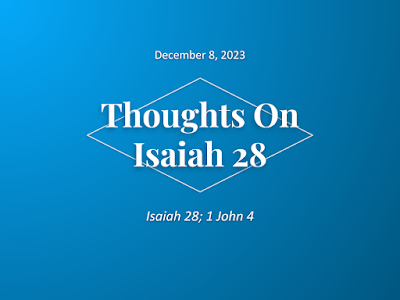Today’s reading: Isaiah 28; 1 John 4
God knows perfectly what He is doing when He brings discipline on us, and it will always be better to go His way, accepting His discipline, than it will be trying to dodge it and go our own way.
God announces to Israel, through Isaiah, that He is bringing judgement on the whole land, and while He considers it His “strange” or “alien” work, it is necessary work that He is going to carry out nonetheless. But right from the beginning of this decree of judgement, God says, “Now therefore do not scoff, lest your bonds be made strong…” They are under God’s hand of discipline and He tells them to accept it, not rebelling against it, so that it doesn’t have to be made worse.
Then, after warning them not to buck against His judgment, lest it get worse, He comforts them with the truth that He is doing this for a purpose, and He, of all people, knows what will and won't accomplish that purpose. He gives a few examples they would have been very familiar with to make His point. He first points them to plowing, pointing out that you don't plow forever because that would defeat the purpose. Yes, plowing tears up the field, but it is not pointless or wanton damage; it is intentional, preparing the field for planting so that it might bear fruit. His next example then is preparing different types of seeds and grain. Dill and cumin, He says, need to be beaten with a rod to be useful, but you would never thresh them with a threshing sledge because it would be too harsh and you would ruin them from usefulness. Grain does need threshed with a sledge to be useful, but even then, you do not grind it forever, but only as much as is needed that it might be useful without being ruined.
What God is telling Israel is that while they are facing his judgement, it is not purposeless, and it is not for their ultimate destruction, but is instead for their ultimate usefulness. God is disciplining Israel so that she might be useful in His hands, and this should be a great comfort to them in the midst of their suffering. This is the assurance that God has not turned His back on them and walked away, leaving them to be utterly destroyed by their enemies for their sin. This is the assurance that, as bad as the discipline may be in the moment, He will not plow or thresh forever, but will withdraw His hand at the right moment. If a human farmer can know what is enough and what would be too much, spoiling their crops or their efforts, how much more so can we count on Yahweh knowing what is enough, and not continuing to push until it is too much and spoils His purposes?
And while it was Israel that God was speaking to in Isaiah 28, we have to recognize that the same truths apply to us today in Christ. If you are truly a Christian, the author of Hebrews tells us in Hebrews 12, you will face God's discipline. It is only the illegitimate child that is not disciplined, so if we are God's legitimate children, then we will, without a doubt, face His discipline. But we have to recognize that, just like with Israel, when God brings discipline into our lives, it is not purposeless, and it is not for our destruction, but is for our good, and God knows perfectly what He is doing and how best to bring about the good He desires in us and in our lives. So, like Israel, when God does bring these things into our lives, we too need to not scoff lest our bonds be made stronger. If we buck against God's hand at work in our lives He doesn't generally just drop it and let us continue on our way, but instead brings harder discipline because He is committed to our good.
The more we recognize that God knows what is best, and knows how to bring about that best, the easier it will be to submit to His hand of discipline, even when it is painful and/or flies in the face of our own plans and purposes. It will always be better to submit to Him and go His way than to stubbornly hold to our own ways, refusing to let Him do His work without a fight.


No comments:
Post a Comment